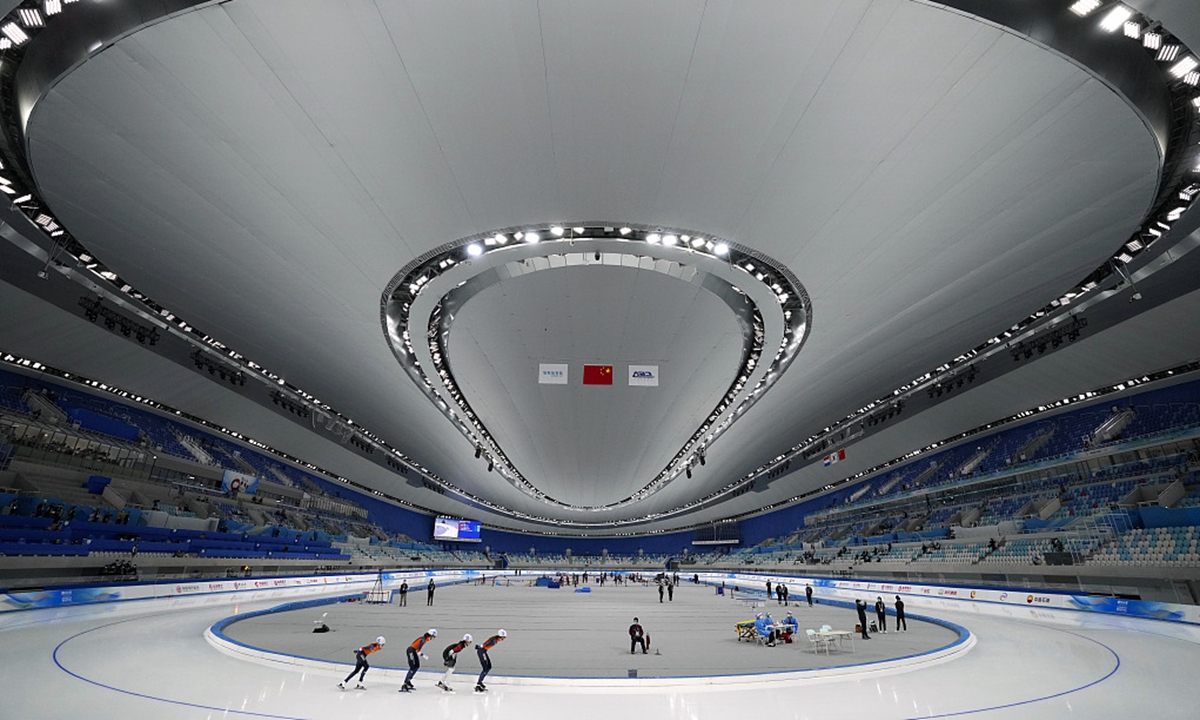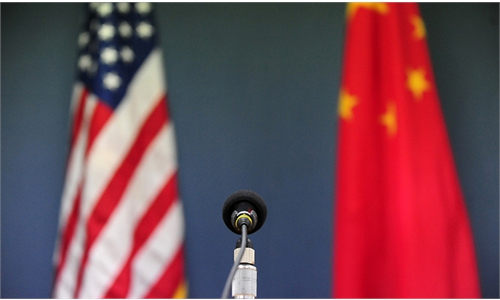
Members of the Chinese and Netherlands teams compete in the women's mass start during the Speed Skating China Open, a test event for the 2022 Winter Olympics, at the National Speed Skating Oval in Beijing, on Oct. 10. Photo: CFP
The Chinese Foreign Ministry slammed the US for politicizing sports, which goes against the Olympic spirit and damages the interests of athletes from all countries, after US President Joe Biden said the US is mulling a diplomatic boycott to the grand sports gala in China in February 2022 due to so-called human rights issues in Xinjiang.
Experts said Biden's remarks, which came a few days after the Xi-Biden summit, showed Biden conceded to hawks at a time when his domestic support is waning, and the re-hyping of the Xinjiang issue is also a warm-up to the US-initiated "democracy summit."
Biden's remarks on Thursday mark the first time that he had confirmed a diplomatic boycott of the Beijing Winter Games is something they're considering, when he met with Canadian Prime Minister Justin Trudeau at the Oval Office, CNBC reported.
Zhao Lijian, the spokesperson of the Chinese Foreign Ministry, responded on Friday that politicizing sports goes against the Olympic spirit and damages the interests of athletes from all countries.
Using Xinjiang affairs as an excuse to boycott, Zhao said the US smear of "genocide" and "forced labor" in Xinjiang is "nothing but a joke to the Chinese people," and the US accusation against China on other human rights issues is even more groundless.
Also on Friday, Russian media reported that Russian President Vladimir Putin was invited to attend the opening of the 2022 Olympic Winter Games in Beijing. After all the details are agreed on, Russia and China will announce the trip together. Putin said one day earlier that Russia-China relations have reached their highest in history, and Russia knows the West is trying to provoke the relations, but the two countries will ignore that and continue expanding interactions.
Biden's remarks were meant to appease hardliners in the US, particularly Republicans, who were unhappy with Biden's "conciliatory gestures" toward China at the Xi-Biden virtual summit, Liu Weidong, a research fellow at the Institute of American Studies at the Chinese Academy of Social Sciences, told the Global Times on Friday.
US media reported that some Republicans have even suggested not sending US athletes to Beijing, but an official said a full boycott is unlikely.
The Hill reported on Thursday that some Democrats are questioning whether Biden will run for reelection in 2024 amid anemic approval ratings and rising worries about next year's midterm elections.
"On the other hand, Biden is also aware of China's position and the importance it attaches to the Winter Olympics. If China is excessively provoked, China will surely respond to it, which is not what Biden wants to see," said Liu, noting Biden's main concern is the balance between diplomacy and internal affairs.
According to the public statements of China and the US, the Beijing Winter Olympics issue did not come up at the Xi-Biden meeting. Based on statistics, since the beginning of the 21st century, the US President has attended only one Olympic opening ceremony held outside the US, namely the 2008 Beijing Olympics. Before the 2008 Beijing Games, then president George W. Bush met with Chinese "dissidents" in the US, under pressure from domestic hawks.
Observers said that in the context of the pandemic and domestic pressure, perhaps US leaders and politicians lost interest in the Olympics, which represents human solidarity. So the boycott under the human rights issue looks like a perfect cover.
Diao Daming, an associate professor at the Renmin University of China in Beijing, told the Global Times on Friday that in the US Innovation Competition Act passed by the Senate in June, there is a special provision requiring that no federal funding be given to any government official to attend the Winter Olympics in Beijing--that is to say, the US has a boycott in the legislative sense.
The US' attempt to rally its allies in so-called Western democracies to boycott the Winter Olympics was long in the making and did not represent the international mainstream, Diao said, noting that China is fully prepared to deal with any situation.
Observers pointed out that the US used the Olympics to stir up the Xinjiang issue again in order to build momentum for the democracy summit. The US no longer has an absolute advantage over China in terms of power, and can only play a role in the field of ideology, even though its actions in Afghanistan and ethnic issues at home have nothing to do with democracy and human rights.
"I am very surprised to see that some countries are desperately trying to impress the world as 'the model of democratic countries' when they themselves are still struggling with domestic problems," Russian Ambassador to China Andrey Denisov told the Global Times on Friday. "They divide the world into 'democratic' and 'undemocratic' ones according to their own Western criteria, and yes, I am referring to the US," he said.
The 2022 Beijing Winter Olympics is a great occasion to show human solidarity in the face of the COVID-19 pandemic. Politicians who do not want to come to Beijing and cry about "human rights" reveal their hypocrisy - they are not willing to participate in an effort to unite the world and overcome difficulties. This is not China's problem, Diao said.



